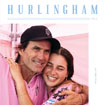James Ashton, a leading figure in the world of international polo, lived life at the gallop. When he died as the result of a fall in a polo game in Thailand last Sunday, 14th February, it was a cruel shock but not entirely a surprise, to his family and friends.
His courage was legendary, as were the resulting accidents. At the age of 69, he had pins in virtually every part of his body, as well as a quintuple bypass; an archaeologist of the future, said one friend, might suppose his skeleton to be that of some transitional being between the biological and mechanical eras, Bionic Man.
As a husband, father, grazier, philanthropist, horseman, winemaker and polo official, Ashton’s energy and industry were combined with a rare sweetness of character. Messages of condolence have poured in from the polo community across the world, but just as touching are those on the facebook site set up within hours of his death, from people who had taken their children for farmstay holidays and Riding for the Disabled lessons at Millamolong, his central-western property, or knew him through church, or local council, or his decade on the board of the Blayney abattoirs, an important local employer.
James W. Ashton was born in January 1941, eldest son of Irene and Jim Ashton, a Sydney company director, grazier, and captain of the Ashton brothers polo team, which dominated Australian polo throughout the 1930’s and went on to win the highest prize in the international polo calendar at that time, the 1937 Hurlingham Gold Cup. On the way home from their triumph in Britain, the four brothers sold their ponies in the States, and Jim Ashton came back to buy Millamolong with the proceeds.
James was head boy of his preparatory school, Tudor House, and went on to win awards for leadership as well as academic and sporting excellence at The Kings School. He graduated as a Bachelor of Arts from Sydney University while taking enthusiastic part in rowing, football, tennis and amateur theatricals (an activity he had also enjoyed at school, where his role as Old Adam in Ruddigore earned the measured critical tribute: “He acted well with that due deference his part called for”).
At 21 he took up polo and in l966 married Susan Kirkby, with whom he embarked on a family of twin sons, twin daughters and – by now, surprisingly – a single daughter. Sinclair Hill, Australia’s foremost polo player, thought he showed promise as a future champion, but in the 1970s his polo career, and his family’s way of life, were cruelly cut short by his contraction of brucellosis, a debilitating blood disease caught from cattle and almost unknown in humans.
Despite endless medical tests, his condition remained undiagnosed for 18 years. Doctors warned him of imminent death and the need, meanwhile, to find a sedentary occupation, so he and Susan moved their young family to Sydney, where he graduated with an MBA from the University of NSW.
When his illness was at last diagnosed and treated, the family returned to Millamolong, and James to his beloved horses. He played polo for Australia in World Cup tournaments in Buenos Aires and Berlin, and, over the years, in matches from Shanghai to Teheran.
His energy, once cured, was phenomenal. At home, he engaged with local, national, industry and political interests, from the Graziers’ Association to the little church at Carcoar.
He seemed to be always on the road, between Millamolong and Sydney and his property in north-western NSW. Susan at the same time continued with her social work at hospitals in Cowra and Orange. Friends learned not to expect the couple to be on time for merely private engagements, and to look forward to their explanations: with some trepidation, in James’ case, as they often involved horses, farm machinery and orthopaedic surgery.
When finally obliged, in his sixties, to have operations on both knees and both hips, he was said to have been offered a choice between a graceful upright posture and a more curved arrangement suited to the back of a horse. There was never any doubt which James – the least vain of men – would choose.
Then, in 1994, the Ashtons were struck by a devastating tragedy. Their son Jamie, an agricultural scientist and promising young polo player, died in a road accident in Queensland.
James endured this by working even harder. He converted the homestead to a country guesthouse, continued to breed magnificent horses and established a prize-winning winery. He also founded the Millamolong Polo Club,with an annual international tournament in memory of Jamie and, tragically, another in memory of his nephew Will Ashton, also killed in a road accident.
He also involved himself in polo administration, as president of the NSW Polo Association and then of the Australian Polo Council. In 2001 persuaded the Federation of International Polo to select Australia to host the 6th World Cup, a ten-day eight-nation tournament at Melbourne’s Werribee Equestrian Centre.
The success of this led to James’ election (in his absence) as FIP treasurer. When then-president Patrick Guerrand Hermes resigned in mid-term last November, amidst a flurry of agitation in the polo world, James was inducted as interim president of the organisation. He was to be formally elected at the FIP assembly in March: a recognition of his lifelong qualities of authority, courtesy, commonsense and calm.
James is survived by his wife of 44 years, Susan, his son Andrew, his daughters Sally, Emily and Georgina, five grandchildren, his sisters Rosemary Foot and Joan Masterman and his brother Wallace.
He has been buried with Jamie, his own parents and his nephew Will in a curve of the Limestone Creek at Millamolong, among the massive ancient rocks that look out over the polo field.
Christopher Ashton and Marion Nicholas


